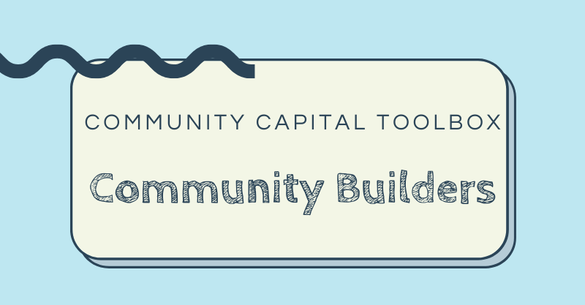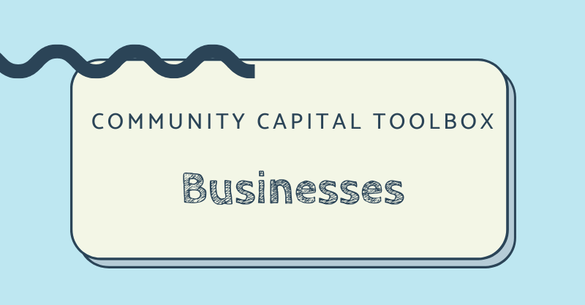Community capital is an exciting idea for regaining control of our economy, but what does it look like in practice?
The following Toolbox includes community capital strategies for two different audiences:
Note: The Community Capital Toolbox is best viewed on a desktop instead of a mobile phone.
The following Toolbox includes community capital strategies for two different audiences:
- community builders who are excited to build the local investing ecosystem in their region but are not affiliated with a particular business; and
- businesses or projects (such as housing or commercial space development) who want to raise money from their communities
Note: The Community Capital Toolbox is best viewed on a desktop instead of a mobile phone.
Input Meter: Measuring Time & Resources Per Tool
Each of the following community capital tools is accompanied by an “input meter.” This meter is a very rough indicator on a scale of 1 through 10 of the level of time and resources each of these strategies takes to implement. It is intended to help you think strategically about the best community capital tool for you and your community, particularly if you are brand new to the movement.
We also encourage folks who are unfamiliar with investing to check out the Getting Started module of our Local Investing Resource Center. It will help you familiarize yourself with investment terms and concepts.
We also encourage folks who are unfamiliar with investing to check out the Getting Started module of our Local Investing Resource Center. It will help you familiarize yourself with investment terms and concepts.
Scroll down to review tools.
Are you ready to grow the community capital ecosystem in your hometown? Continue reading to explore the tools we can use to collectively practice local investing in our own neighborhoods.
|
Investing clubs and networks are both structures that help collectivize the process of investing locally. A local investing club is a group of investors that pool their money and make collective investing decisions. A local investing network is a group of people that do not pool their money and make their own independent investing decisions but still learn about investments together. Starting a local investing club/network is a way to build community and visibility around community capital and local investing in your region without the same hurdles as a full-fledged community investment fund.
Learn more about investment clubs and networks here. |
|
|
Democratic Microgranting refers to the process of pooling funds from a large group to grant to projects that are selected through a voting process. Detroit SOUP is a pioneer of this model – they run a microgranting dinner celebrating and supporting creative projects in Detroit. For a donation of five dollars, attendees receive soup, salad, bread, and a vote and hear presentations ranging from art, urban agriculture, social justice, social entrepreneurs, education, technology, and more. At the event, attendees eat, talk, share resources, enjoy art, and vote on the project they think benefits the city the most.
While Democratic Microgranting is not technically a form of investment (participants do not get a monetary return on their $5 donation), it is a relatively low-cost way to build excitement in your community about local businesses/projects and to engage your neighbors in a democratic process of allocating funds. |
Input Meter
|
|
There may be a variety of local raises happening in your community, but it’s hard to find them without a centralized portal for investors to peruse. Or, businesses and other development projects might be interested in raising capital locally, but they’re worried that they’ll have trouble reaching potential investors.
A local investment web portal might solve that problem. While there are few examples of this currently, they are becoming increasingly popular and accessible options for expanding the visibility of local investment opportunities. For inspiration, look to Crowdfund Montana, a locally-branded version of a larger FINRA-regulated crowdfunding platform (Crowdfund Mainstreet) designed to connect Montana residents with local investments. Huron County, Michigan launched Grow HuCo to connect investors to local opportunities and businesses to technical assistance. The 10K Project aggregates raises of businesses led by Black founders, in addition to providing education about investing to their member community. Note that these groups did not set up new FINRA-regulated Crowdfunding portals. That is a difficult and long process that probably can’t be done cost-effectively at a community scale. These sites point to existing portals and simply aggregate and brand for the community that they are trying to reach. Finally, SmallStreet.org will soon offer communities the ability to license “white label” software, web pages, and other communication tools to promote local investment opportunities and to help local businesses take full advantage of them. Supplemented with detailed background materials, videos, webinars, and classes SmallStreet will enable even a small community to unlock quickly and inexpensively the full potential of existing local investment opportunities. Be on the lookout for updates in late summer 2022. |
|
|
Community Investment Funds (CIFs) are professionally-managed investment funds with three essential characteristics: capital is sourced from people in the community (ideally including retail/non-accredited investors); capital is invested into local people, projects, and businesses; and capital is deployed by individuals in the community. A successful community investment fund benefits investors and the community, through a positive rate of return and an influx of non-extractive capital to local businesses and development projects (such as renewable energy infrastructure, affordable housing, or community spaces). CIFs make local investing easier for retail investors looking to put their money somewhere where they might earn a monetary return and experience the positive social benefits of having a well-resourced local economy, without having to do due diligence on individual businesses and projects. It allows the aggregation of that work and oversight by investment professionals, making community investing accessible.
NC3 is passionate about supporting the creation of new CIFs through education. However, we know that the legislation surrounding investment funds (in particular the Investment Company Act of 1940) needs updates. NC3 engages in advocacy for better regulations surrounding CIFs to make them easier to start and manage. Setting up a fund is a long-term commitment that requires dedication and determination, but it provides one of the greatest payoffs for growing the community capital ecosystem in your region. You can access the tools we’ve developed for prospective CIF developers here. |
FROM
Input Meter
TO
Input Meter
|
We have learned that community capital strategies more often succeed when they work together and interdependently. Is there a microloan fund that could direct successful businesses to a rewards-based crowdfunding platform? Is there an investment crowdfunding platform that allows businesses to grow past the startup phase into the growth phase, making them a good candidate for a Community Investment Fund?
There are many ways these strategies can reinforce and support one another, and we encourage you to prioritize collaboration while building out the right strategy for your community.
There are many ways these strategies can reinforce and support one another, and we encourage you to prioritize collaboration while building out the right strategy for your community.
Are you a business or other capital-raising entity that believes your investors should come from your own community? Below is a brief overview of the tools businesses and developers can use to raise capital from a diverse group of local investors.
Since securities laws at both the state and federal levels regulate these investments, many businesses seek out legal advice to determine the best securities and compliance strategy for their needs. If you’re ready to pursue a raise, consider consulting with one of the technical assistance providers in our Technical Assistance Directory.
Note: much of the following information has been adapted from Cutting Edge Counsel’s blog.
Since securities laws at both the state and federal levels regulate these investments, many businesses seek out legal advice to determine the best securities and compliance strategy for their needs. If you’re ready to pursue a raise, consider consulting with one of the technical assistance providers in our Technical Assistance Directory.
Note: much of the following information has been adapted from Cutting Edge Counsel’s blog.
What is a security?
The definition of a security can be quite broad, but generally "security" refers to a financial asset or instrument that has value and can be bought, sold, or traded.
If a seller’s purpose is to raise money for the general use of a business enterprise or to finance substantial investments and the buyer is interested primarily in the profit the note is expected to generate, the instrument is likely to be a “security.” Learn more about what could be considered a security here.
The definition of a security can be quite broad, but generally "security" refers to a financial asset or instrument that has value and can be bought, sold, or traded.
If a seller’s purpose is to raise money for the general use of a business enterprise or to finance substantial investments and the buyer is interested primarily in the profit the note is expected to generate, the instrument is likely to be a “security.” Learn more about what could be considered a security here.
|
Rewards-based crowdfunding is a type of small-business financing in which entrepreneurs solicit financial donations from individuals in return for a product or service. Kickstarter and Indiegogo are two of the most well-known platforms. The Local Crowd is a rewards-based crowdfunding platform with an emphasis on local economies and business education.
Rewards Crowdfunding is not a securities offering, and individuals who donate money do not receive a monetary return. For that reason, NC3 considers rewards crowdfunding to be a capacity-building step in the direction toward a true community capital offering. Many businesses are not ready to make a securities offering but can flex their networking and community-building skills by first hosting a reward-based capital raise. |
|
|
Investment Crowdfunding is a securities offering that is open for investment by the “crowd”—both accredited and non-accredited investors. Regulation Crowdfunding became nationally available to non-accredited investors in 2016 and has only gained in popularity. It is similar to various online donation-and-reward crowdfunding models, except that the issuer may offer securities to investors—with the possibility of eventual profits—instead of just product or service rewards.
|
Input Meter
|
Choosing the right Rewards or Investment Crowdfunding platform for you business can be difficult. Crowdfund Better, a crowdfunding technical assistance organization, has made this process easier by creating a free "Crowdfunding Cheat Sheet" of reputable platforms for you to consider. You can sign up to receive their Cheat Sheet here.
|
Direct Public Offerings, or DPOs, are securities offerings by enterprises to a wide audience that do not require a portal or other intermediary (like a Reg CF portal or investment bank). By using a DPO, a business or nonprofit can market and advertise its offering publicly by any means it chooses — through advertising in newspapers and magazines, at public events and private meetings, and on the internet and through social media channels. DPOs can be focused on a single state or multiple states. For-profit corporations, LLCs, cooperatives, and revenue-generating nonprofits can all raise capital through a DPO.
DPO is not an official term in the eyes of the SEC, and it encapsulates a few different legal strategies for raising capital. Some of the most common compliance strategies to comply with both federal and state securities laws include: |
|
|
|
You can read more about direct public offering strategies here and here.
Finally, many business owners who want to raise capital from their community conduct a private offering before a community capital offering. It can be a helpful preliminary step to make sure your financials are ready for a public offering. Two types of private offerings to be aware of are Regulation D Rule 506(b) and 506(c). Rule 506(b) is a traditional private offering in which you can only identify investors through one on one conversations. Generally, all investors have to be accredited. This is what the overwhelming majority of capital raises look like. Rule 506(c) allows you to advertise a private raise publicly, but the raise is still limited to accredited investors. Under this ruling, businesses have to collect information from investors to verify their accredited status. 506(c) helps businesses cast a wider net and can help business owners who are not already connected to wealthy networks find accredited investors. |
|
|
The three previous tools all require direct outreach to your community of supporters. This tool provides a slightly different approach to raising community capital. If there is a Community Investment Fund (CIF) in your area that lends to businesses like yours, you can consider applying for their funding. Since CIFs receive investment from the local community, this is an indirect way to harness the power of local capital.
Unfortunately, most places do not have active CIFs, but part of NC3’s mission is to proliferate the spread of these types of funds. You can check out our Investor Group Directory to get started (although CIF might exist that have not joined the directory yet). |
Input Meter
|
Are there any tools of community capital that have been effective in your community or business that you want to share with the world? We’d love to hear from you. Feel free to fill out this feedback form.










